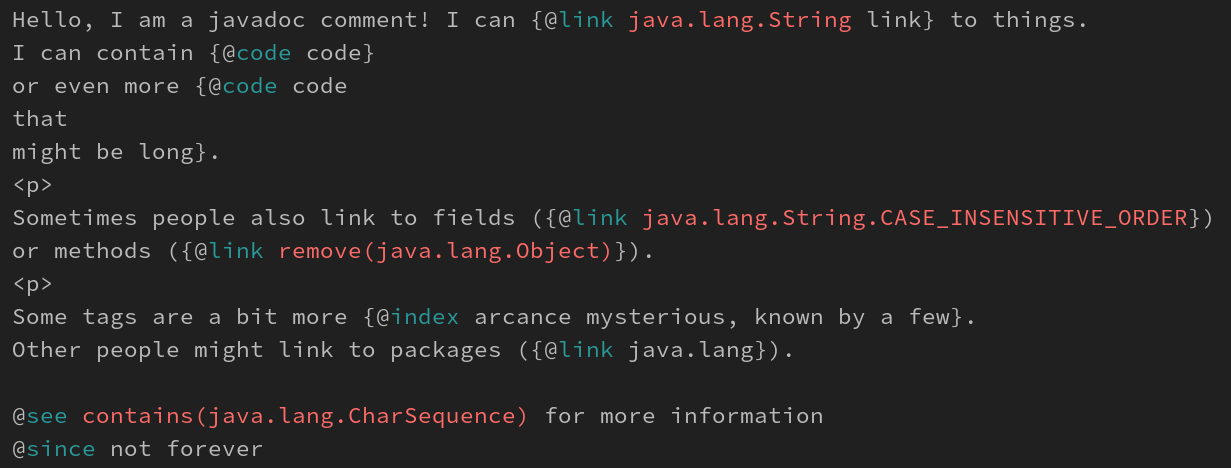The spoon-javadoc submodule provides a parser for javadoc comments, producing a
structured syntax tree representing the comment. Each tag is parsed and
tokenized according to the rules in the javadoc specification. Additionally,
references in e.g. @link or @see tags are resolved to CtReferences,
allowing you to easily analyze them.
A visitor infrastructure is also provided, which eases analyzing comments or
converting them into your own format.
Installation
To use spoon-javadoc, add the following dependency to your pom.xml:
<dependency>
<groupId>fr.inria.gforge.spoon</groupId>
<artifactId>spoon-javadoc</artifactId>
<version>$currentVersion</version>
</dependency>
Basic usage
To get started you get the raw javadoc string (including /** and */) and
pass it to a newly created JavadocParser.
You then call parse and get back a list of elements, corresponding to text,
inline tags or block tags.
Using a JavadocVisitor you can then visit each of them and drill down a bit.
In the following example, javadoc is parsed and then printed out again – but
this time with some ANSI color highlighting applied. Note that references are
pretty-printed according to CtReference#toString().
void example() {
String javadoc = "/**\n" +
" * Hello world, this is a description.\n" +
" * How are you doing? I am just fine :)\n" +
" * This is an inline link {@link String} and one with a {@link String label}\n" +
" * and a {@link String#CASE_INSENSITIVE_ORDER field} and {@link String#replace(char, char) with a space}.\n" +
" * {@link java.lang.annotation.Target @Target} chained to @Target.\n" +
" * <p>\n" +
" * We can also write <em>very HTML</em> {@code code}.\n" +
" * And an index: {@index \"Hello world\" With a phrase} or {@index without Without a phrase}.\n" +
" * {@snippet lang = java id = \"example me\" foo = 'bar':\n" +
" * public void HelloWorld(){ //@start region = \"foo\"\n" +
" * System.out.println(\"Hello World!\"); // @highlight substring=\"println\"\n" +
" * int a = 10; // @start foo=bar :\n" +
" * int a = 10; // @end\n" +
" * } // @end region=foo\n" +
" *}\n" +
" * <h2><a id=\"resolution\"></a>{@index \"Module Resolution\"}</h2>\n" +
" *\n" +
" * @param args some argument\n" +
" * @author a poor {@literal man}\n" +
" * hello world\n" +
" * @see String#contains(CharSequence) with a label\n" +
" * @see String#replace(char, char)\n" +
" */\n";
List<JavadocElement> elements = new JavadocParser(
// Raw comment string including "/*" and "**/"
// You can get this using CtComment#getRawContent from a spoon element.
javadoc,
// The reference element so resolving of links works correctly.
// Javadoc comments can use "#foo" to refer to fields/methods
// in the current class.
new Launcher().getFactory().Type().OBJECT.getTypeDeclaration()
).parse();
for (JavadocElement element : elements) {
System.out.print(element.accept(new ExampleVisitor()));
}
}
private static class ExampleVisitor implements JavadocVisitor<String> {
@Override
public String defaultValue() {
throw new RuntimeException("Visit method not implemented");
}
@Override
public String visitInlineTag(JavadocInlineTag tag) {
String result = "{@\033[36m" + tag.getTagType().getName() + "\033[0m";
for (JavadocElement element : tag.getElements()) {
result += " " + element.accept(this);
}
result += "}";
return result;
}
@Override
public String visitBlockTag(JavadocBlockTag tag) {
String result = "@\033[36m" + tag.getTagType().getName() + "\033[0m ";
for (JavadocElement element : tag.getElements()) {
result += element.accept(this);
}
result += "\n";
return result;
}
@Override
public String visitText(JavadocText text) {
return text.getText();
}
@Override
public String visitReference(JavadocReference reference) {
return "\033[31m" + reference.getReference() + "\033[0m";
}
@Override
public String visitSnippet(JavadocSnippetTag snippet) {
String result = "{@\033[36m" + snippet.getTagType().getName() + "\033[0m ";
result += snippet.getAttributes()
.entrySet()
.stream()
.sorted(Map.Entry.comparingByKey())
.map(entry -> entry.getKey() + "='" + entry.getValue() + "'")
.collect(Collectors.joining(" "));
result += " : ";
for (JavadocElement element : snippet.getElements()) {
result += element.accept(this);
}
result += "}\n";
return result;
}
}
This will print a version with a bit more colours:

Snippets
Spoon-javadoc provides the JavadocSnippetBody class to help parse javadoc
snippets:
JavadocSnippetBody body = JavadocSnippetBody.fromString(
"class Foo { // @start region=\"foo\"\n" +
" int p0 = 0; // @start region=\"bar\"\n" +
" int p1 = 1;\n" +
" int p2 = 2; // @end\n" +
" int p3 = 3; // @end\n" +
"}\n"
);
body.getLines(); // returns all lines of the original snippet
body.getRegions(); // returns all start/highlight/link regions
body.getActiveRegionsAtLine(0); // returns all regions active in the given line